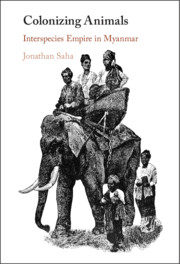1 - Valuing Animals
Published online by Cambridge University Press: 29 October 2021
Summary
Here I outline two crucial concepts that are returned to throughout the book. The first is the notion of ‘undead capital’, a concept that provides a lens to analyze the specific commodity form that working animals took in the colony. The second is an expanded understanding of colonial bio-politics, a politics that I argue served to render animals (including humans) into three states, namely, as subjects, as objects, and as abject. Together these concepts outline two key underpinning forces that shaped how animals came to be valued under colonial rule in Myanmar. In the first concept, this was through a process of valorisation as animal capital. In the second concept, this was through a governmentalizing evaluation of an animal.
- Type
- Chapter
- Information
- Colonizing Animals , pp. 28 - 50Publisher: Cambridge University PressPrint publication year: 2021

